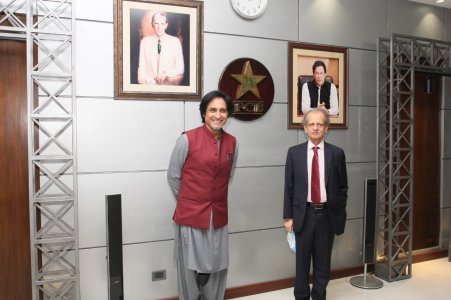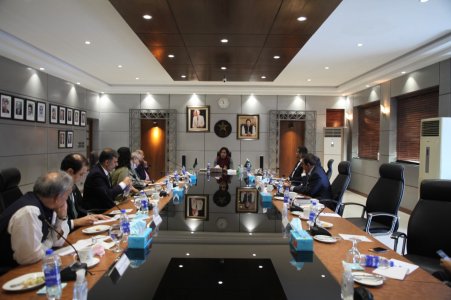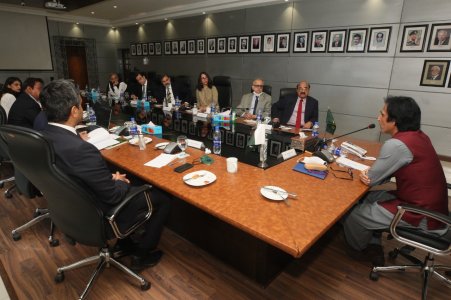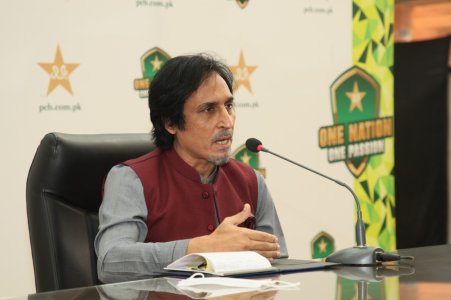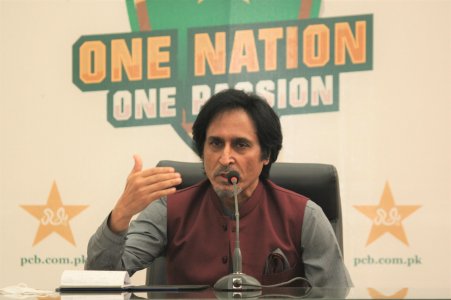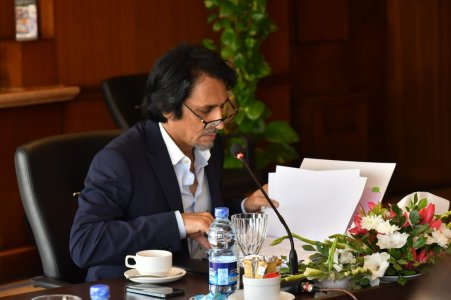Ramiz Raja at 60: A cornered tiger still swinging by Elizabeth Botcherby
Ramiz Raja at 60: A cornered tiger still swinging
by Elizabeth Botcherby
August 14, 2022
The PCB chair discusses the 1992 World Cup win, playing India in bilateral cricket again and developing young cricketers to mark his 60th birthday
There isn't much Ramiz Raja hasn't seen during his 45-year involvement with cricket in Pakistan. A player, a captain, a commentator, an administrator and now the 36th chair of the Pakistan Cricket Board. On and off the field, he has a reputation for being a smooth operator, stylish, and charismatic. One event, however, still has the power to bring a child-like glee to his face.
The 1992 Cricket World Cup.
It's 30 years since Pakistan lifted their maiden 50-over crown – Raja himself is 60 not out. "The soul is young but the vessel… time flies," he reflects wistfully. But the triumph, a seminal moment for Pakistan, remains as fresh in both his and the nation's memory as if it were yesterday.
"That would be the clincher in my career, winning the World Cup," Raja beams, clearly never tiring of reliving Pakistan's finest hour. "It was an historic moment. Pakistan was rediscovered on the cricketing world atlas but also generally in the world, we got prominent overnight. We went through so many highs and lows and eventually delivered in that all-important final.
"When we were landing at Lahore airport, the entire tarmac was full of people. We had no clue, there was no social media. My wife told me so many people were happy but when we landed in Lahore, only then we realised what we had accomplished. We have re-runs in Pakistan, even now they're massive. You realise you were part of history."
Pakistan's victory is remembered as one of the sport's great comeback tales. Down and out after picking up just one win from their opening five matches, Imran Khan's "cornered tigers" snuck into the semi-finals by a single point.
Three successive victories and a helping hand from Australia (they denied West Indies a crucial win in the final group match) came before beating New Zealand by four wickets in Christchurch to reach the final. At the MCG, Pakistan beat England by 22 runs, with Khan fittingly taking the final wicket – Richard Illingworth, caught by Raja at mid-off.
"We didn't really understand the concept," Raja laughs, referring to Khan's infamous speech. "Imran's a wildlife junkie. He said when a tiger is cornered, that's when you've got to be afraid of him. We were good in that regard, that never say die spirit.
"Four or five of us were considered senior cricketers and we had a mini-meeting and said it's time to rise and deliver. In those five must-win games, we probably had five different man-of-the-match winners. Someone had to lose for us to qualify and after beating New Zealand, we knew from that moment on nothing will beat us.
"We came to know early in our careers that you never drop a catch off Imran Khan – he makes you pay for that folly. The moment the ball went up in the air – it wasn't a skier, it was an easy catch – I could see from the periphery of my eyeline there were players waiting to take the stumps out and Imran shouted, 'Catch it!', so it had to be taken. It felt like an eternity, that ball coming down and lodging in my hands."
Raja's contribution wasn't limited to that catch. He scored 349 runs at 58.16, including a ODI career-high score – 119 not out – in the final group match against New Zealand, finishing fifth in the overall run-scoring charts. Five years earlier, he had scored the same number of runs in the 1987 World Cup, leading the way with the bat for Pakistan. The world stage, he believes, brought out the best in him.
"I always felt here's a chance to become renowned, famous, oblique," he said. "It's a bit like whenever great batsmen played against Shane Warne. There are two things would happen – either you froze and got out to his sleight of hand, or you wanted to overpower him to make the headlines.
"Hail the batsman who demolished Warne! World Cup events were like hitting Shane Warne out of the park. If you were able to win matches with your contributions, it meant the world recognised you as a talent. I still believe if you're not able to do well in a World Cup event, no matter how many times you've done well in bilateral series, it's the stage that makes you great."
Raja had many a battle with the late Australian legspinner. Malcolm Marshall, Courtney Walsh and Manoj Prabhakar all dismissed him more times in Test cricket, but it's the encounters with Warne that stick in the memory.
"The damn thing about Shane was he would remember each of his dismissals," Raja says, the briefest flash of irritation quickly replaced by a knowing smile.
"Every time we'd meet up in the comms box he'd tell me, 'You didn't read my flipper!' An outstanding talent he was, and he loved the game. He used to create this slow death and slow drama. He would surprise you with a massive turner, then you were looking out for it but wouldn't see it for two or three overs. He would tease you. He was a tremendous sportsman and played the game in the right way."
Australians and West Indians dominate his greatest opponents, although one player stands head and shoulders above the rest.
"West Indies had such a fabulous bowling attack and you felt great facing the new ball of Malcolm Marshall and Michael Holding and Patrick Patterson – loved every moment of it.
"But Viv Richards was way ahead of his time. He played the game with a swagger, my hero. We were brought up on Viv Richards as an Under-19, I remember my brother was playing in a Test match in Lahore and we were the ushers, serving drinks and coffee to the players. All I wanted was for my brother to take me to Viv Richards so I could shake his hand. That was the kind of fan following I had for the man."
Raja's international career spanned 14 years, from his Test debut against England in 1984, a rare outing alongside older brother Wasim – "he was like a dad, worrying about whether I'd eaten or slept properly" – to his final ODI appearances against India in the unlikely setting of Toronto in 1997.
He scored 5,841 runs, including nine centuries, in 198 ODI matches, a haul which places him 11th in Pakistan's all-time list, and a further 2,833 runs at 31.83 in 57 Tests.
Since hanging up his spikes in the late 1990s, Raja remains a central figure , working as a commentator on both international and domestic cricket and serving as chief executive of the PCB in the early 2000s before his investiture as chairman of the board in September 2021. Family, however, has been at the heart of every one of these decisions.
"I was offered this [commentary] gig and I refused it," he admits. "The commentators we had in Pakistan were oldies who hadn't played the game. It was my brother who said it would be good for me, so I said I'd do this one time only. I'd done my MBA; I started my career at American Express and wanted to maybe end up in a job in a bank. But it was too late for me to do anything other than cricket.
"I didn't want to [be PCB chair] initially either. I was asked who would be a good person, I would suggest names, and this would carry on for a few months. In the end, I got tired and asked what do you have in mind – a banker, a bureaucrat, an ex-cricketer? That was a mistake. The moment I said ex-cricketer they zoned in on me!
"When England pulled out, we were told the players were spooked, which is an alarming statement"
The family – his two sons, wife and sister-in-law – assembled at the breakfast table for a vote. His sons said he was out of mind to give up his commentary career, his wife told him to put his money where his mouth is: "I've got an Urdu YouTube channel with a good following and all the time I was suggesting stuff for Pakistan cricket to improve. She said now is your chance to prove what you said."
His chairmanship, rather like his Test career, got off to a rocky start. He'd only been in office a few days when New Zealand pulled out of their ODI tour of Pakistan, citing a security alert from their government. Three days later, England followed suit, cancelling the men's and women's white-ball tours which were due to precede the 2021 T20 World Cup.
For the PCB, it was devasting. Following the attack on Sri Lanka's team bus in 2009, international cricket was absent from the country for six years, the national team nomadic until Zimbabwe's visit in 2015. The arrival of touring sides from the "Western bloc" represented a significant step forward for Pakistan.
Just as it had during the 1992 World Cup, a lifeline would come from Australia.
"When England pulled out, we were told the players were spooked, which is an alarming statement," Raja said. "I'd just taken office, so we had to be quick to get people on our side.
"Everyone was hesitant about whether Australia would make the trip [in Spring 2022] but thankfully they did. And everything is rosy now because England are coming for seven T20s and New Zealand later on.
"I want to tell the world that we had Australia as our Pakistan ambassadors. When they go out to their families, their fans, other leagues, they can hail the efforts of the PCB and how well everything was conducted – except for the damn pitches! It was a tremendously successful tour and there was a lot of camaraderie.
"We've taken a lot of steps to get back the confidence of the world. Every time a team comes here there is presidential security. It is expensive to undertake but we cannot keep our eyes off it; we have to make sure an incident like the Sri Lanka bus attack doesn't happen. Every time a team comes here, we go through the same ritual. Now, 2022 is going to be the most important season in our past 20 or 30 years.
Now the dust has settled, he can concentrate on implementing the changes he wants to see, based around his three pillars of organisational excellence, commercial excellence and cricketing excellence.
The Pakistan Super League, one of the PCB's "properties" and the jewel in their domestic crown, must adapt in order to compete with the growing numbers of franchise leagues and retain its place as "the second best league for money and talent".
He plans to transition towards to an IPL auction model, or at least incorporate auction elements into the draft, as well as taking matches nationwide rather than restricting fans to Lahore or Karachi.
"Multan should play matches in Multan. The three ODIs against West Indies there were sold out in 50 degree heat!" he says. "It entails extra money and expenditure but we're willing to do that. Everyone wants a slice of the PSL and wants to see their best cricketers play in their areas –we're going to make sure we do that.
"Lahore was buzzing [for the finals]. You had 30,000 or 40,000 in the stadium and 10,000 or 20,000 outside, and that continued for days. There is a lot of potential but there's a lot of leagues that can offer stiff resistance. We've got to get out of the rut and place ourselves in a different tier."
Plans have also been drawn up for a women's PSL, a step he sees as essential to improving the national side and developing a deeper player pool. Ensuring access to regular matches, both domestically and internationally, is also a priority.
The wheels are already in motion for the latter, with a home series against Sri Lanka – "we beat them!"- and a triangular series against Ireland and Australia preceding their involvement in the Commonwealth Games.
However, his focus for the next few months is laying the foundations for a pathway from junior cricket to the national side. One hundred cricketers aged between 13 and 19 have been selected for the PCB's Junior Development Programme, with the recipients supported with free equipment, free education and a 30,000 rupee monthly retainer. He also plans to host the Pakistan Junior League this October, a six-team T20 league featuring the country's most promising Under-19 players.
"Maybe it would have made me a bit more relaxed when playing Test cricket. It would have given me more leverage and more aggression; I was afraid to go whole-heartedly and go berserk."
However, with players now representing multiple franchises in a single season, Raja worries T20 cricket is breeding "selfish" cricketers.
"I don't know whether, from a team point of view, they have that same audacious will to win. You are cold-blooded because you want your 50 off 30 balls so you can play next season.
"It's difficult to work on the spirit of the game because you're changing dugouts five or six times a year. I'm not sure the younger generation are too keen to lay their lives for the sake of the side."
Perhaps that's the biggest change of his cricketing career: the days of the cornered tiger may be numbered.
Link:
https://www.thecricketer.com/Topics/premium/ramiz_raja_60_cornered_tiger_still_swinging.html
